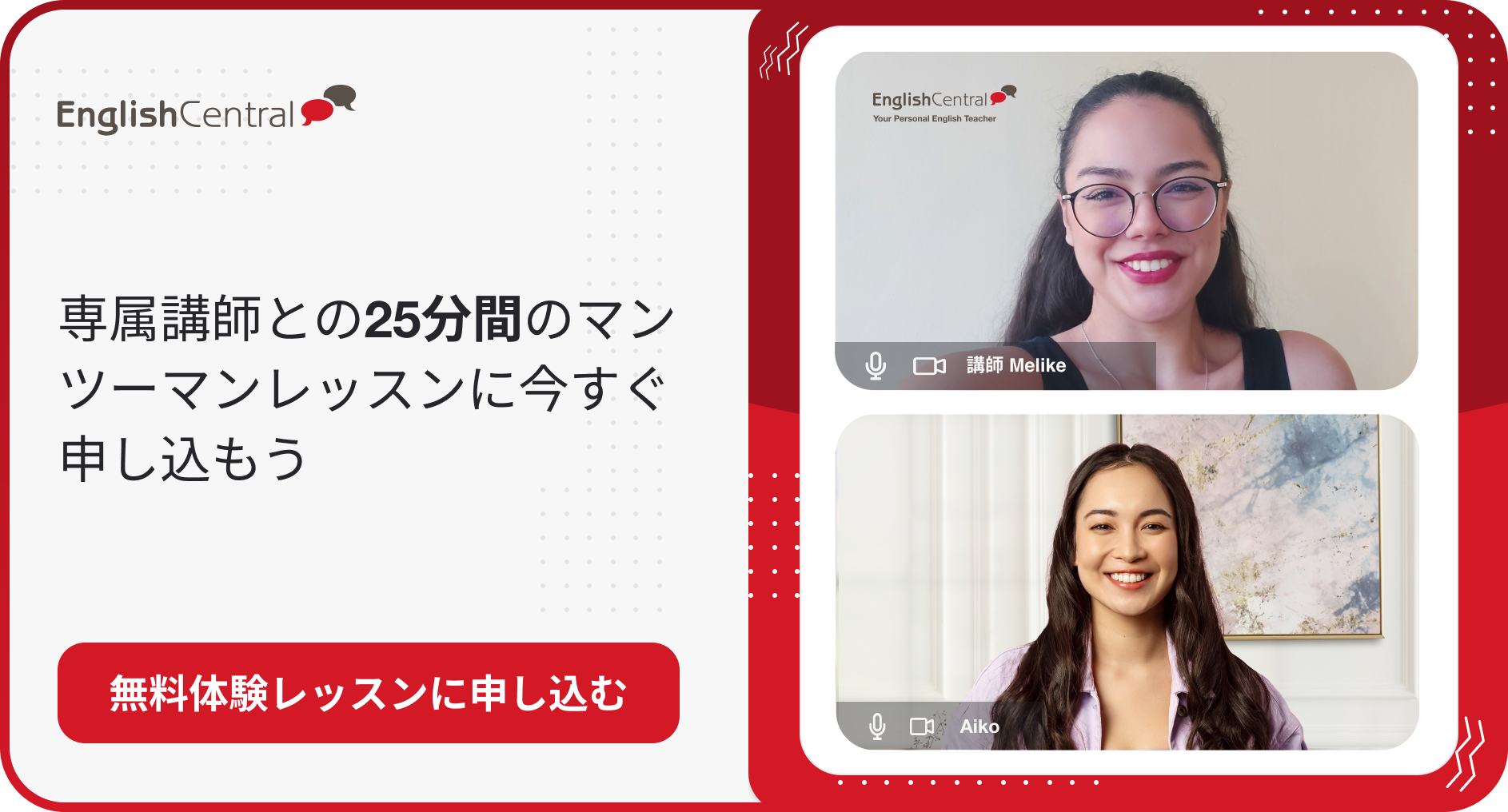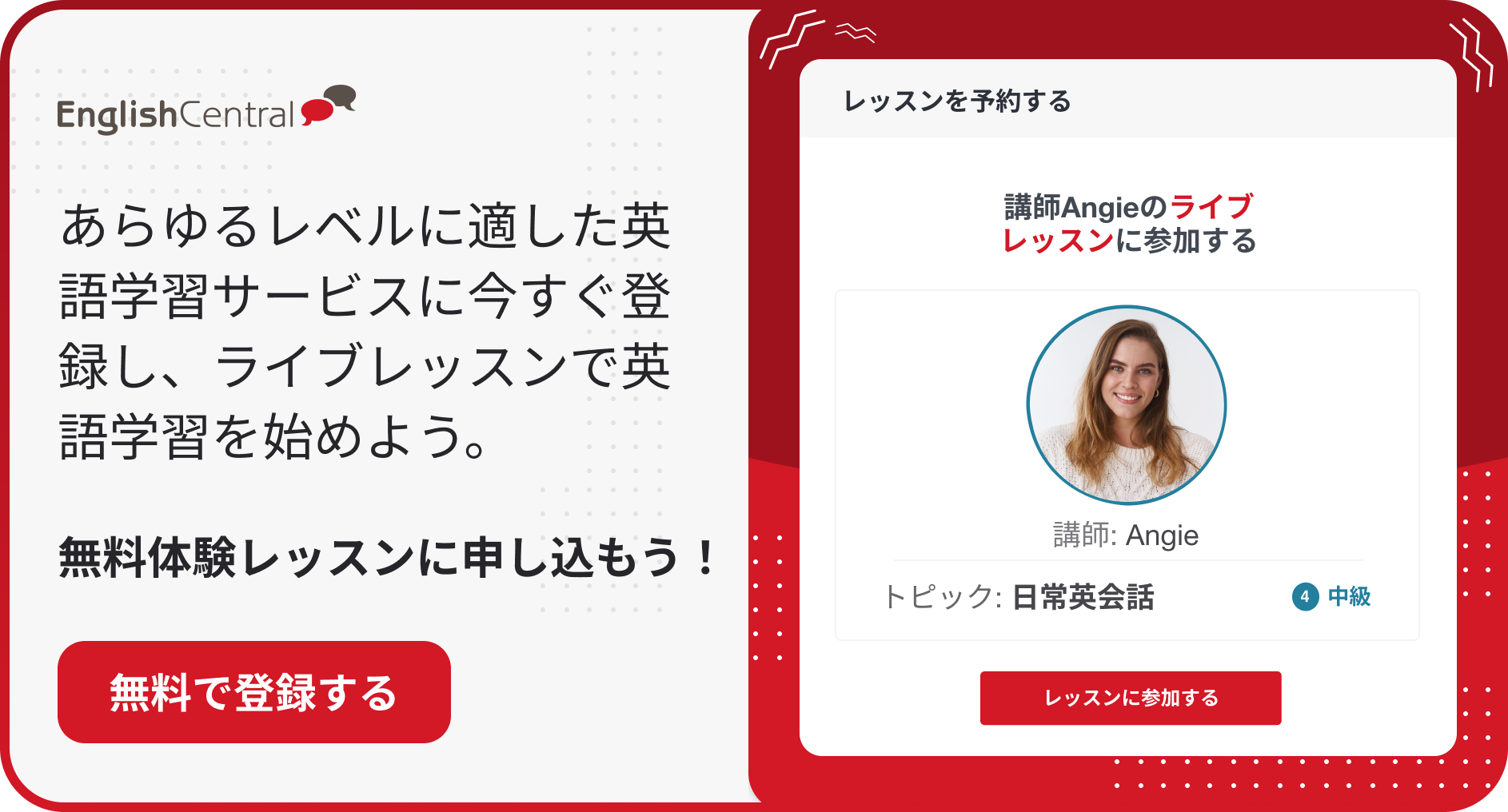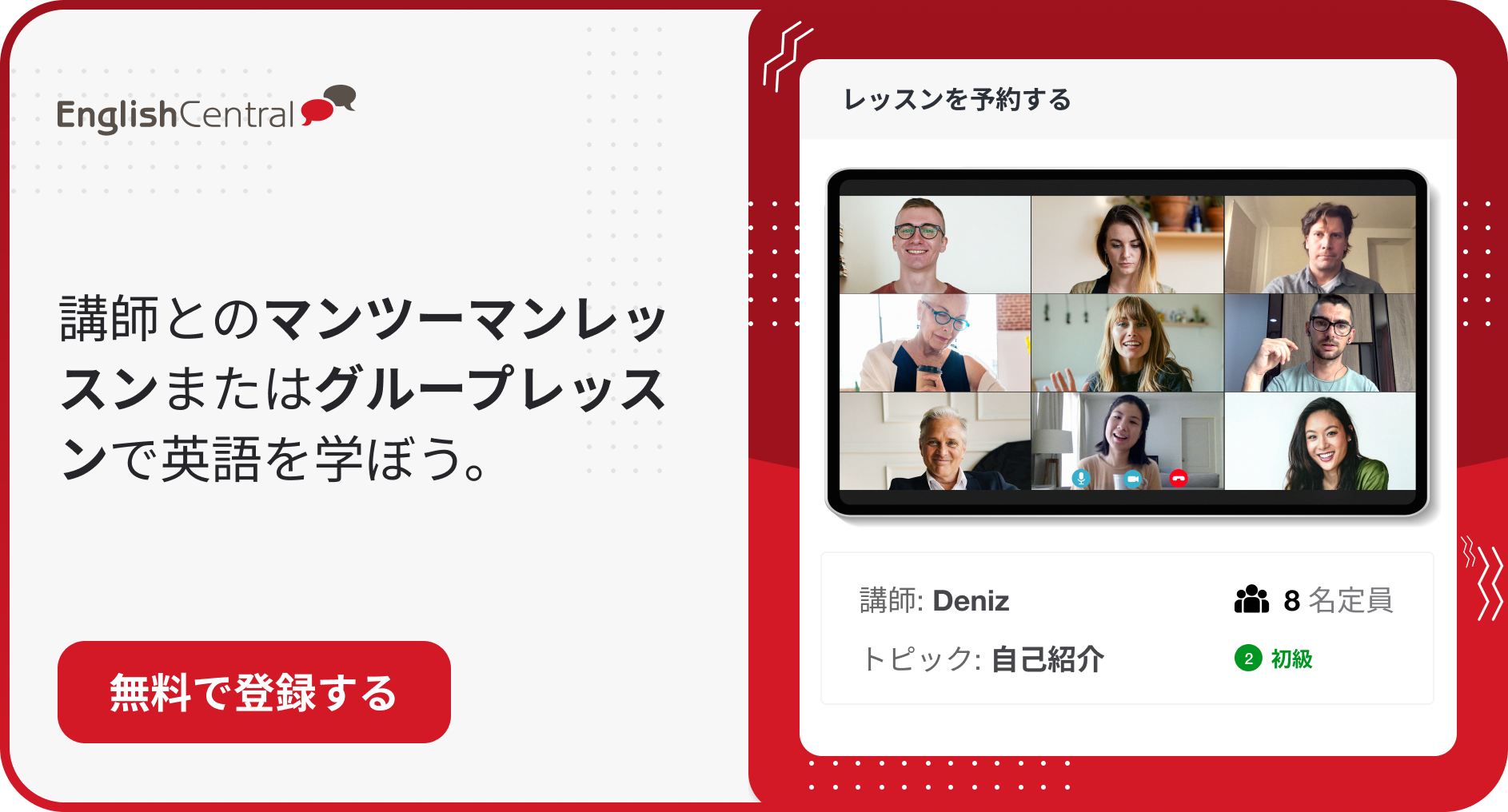英語を学ぶとき、似ている単語の意味や使い方を混同することがありますよね?
今回は、よく似た英単語の微妙な違いに焦点を当て、それぞれの使い方やニュアンスをわかりやすく解説します。コミュニケーションにおいて、正しい言葉の選択はとても重要です。間違いやすい単語を混同せずに使い分けられるようになりましょう!
この記事で学習する内容を練習してみませんか?EnglishCentralは全世界で800万人が利用!動画を活用した英会話レッスンをもっと手軽に。ChatGPTと提携したAI機能を駆使して、あなたの英語総合力を鍛えます。無料登録後、20,000本の動画見放題。そして、オンライン英会話レッスン1回無料。こちらから。
Above or Over?
“above” は何かの上にあることを表し、”over” は何かの上を通過することを表します。
例文:
– The bird is flying above the clouds.(鳥は雲の上を飛んでいます。)
– The plane flew over the mountain.(飛行機は山の上を飛びました。)
All or Whole?
“all” は集団全体を指す一般的な言葉ですが、”whole” は集団を構成する個々の要素が完全であることを指します。
例文:
– I ate all the cookies.(クッキーはすべて食べました。)
– The whole class went on a field trip.(クラス全体が遠足に行きました。)
Also, as well or too?
“also”, “as well”, “too” はどれも「も」という意味を持ちます。”also” と “as well” は文の中で使われ、意味や動作を追加する際に使用されます。”too” は文の末尾に置かれることが一般的で、前の発言と同様の意味を持ち、「〜もまた」という意味を表します。
例文:
– She also likes to read.(彼女も読書が好きです。)
– He is coming to the party as well.(彼もパーティーに来ます。)
– I want to go to the concert, too.(私もコンサートに行きたいです。)
Amount of, number of or quantity of?
“amount of” は不可算名詞、”number of” は可算名詞の数、”quantity of” は量という意味を持ちます。
例文:
– There’s a large amount of sugar in the jar.(瓶には大量の砂糖が入っています。)
– The number of students in the class is increasing.(クラスの学生数が増えています。)
– We need a small quantity of flour for this recipe.(このレシピには少量の小麦粉が必要です。)
Apart from or except for?
“apart from” と “except for” は同じ意味を持ち、「〜以外の」という意味を表します。
例文:
– Apart from English, she also speaks French.(英語以外に、彼女はフランス語も話します。)
– I like all fruits except for bananas.(バナナ以外の果物はすべて好きです。)
As, because or since?
“as”, “because”, “since” は理由を表す接続詞です。
“as” と “since” は似たような意味を持ち、「〜ので」という意味で使われますが、”as” は原因と結果の関係を強調し、”since” は時間的な経過を強調します。一方、”because” は文法的にもっとも一般的な原因を示します。
例文:
– He couldn’t sleep as he had drunk too much coffee.(彼はあまりにもたくさんコーヒーを飲んだので眠れませんでした。)
– They canceled the picnic because of the rain.(彼らは雨のためにピクニックをキャンセルしました。)
– I have been studying Japanese since I came to Japan.(日本に来てからずっと日本語を勉強しています。)
Beside or Besides?
“beside” は「隣に」、「そばに」の意味で使われ、”besides” は「〜の他に」という意味で使われます。
例文:
– She sat beside me during the movie.(映画の間、彼女は私の隣に座っていました。)
– Besides English, she also speaks French.(英語の他に、彼女はフランス語も話します。)
Consist, comprise or compose?
“consist”, “comprise”, “compose” は全て「構成する」という意味を持ちます。
“consist” は何かが他のもので構成されていることを示し、「〜から成り立っている」という意味を持ちます。”comprise” は「〜から構成されている」という意味で、何かが他のもので構成されていることを示します。一方、”compose” は何かが他のものを構成していることを強調し、「構成する」という意味を持ちます。
例文:
– The committee consists of five members.(その委員会は5人のメンバーから成り立っています。)
– The United States comprises fifty states.(アメリカ合衆国は50の州から成っています。)
– The painting is composed of various colors.(その絵は様々な色で構成されています。)
Each or Every?
“each” と “every” はどちらも数量を示す言葉です。”each” は個々の要素やグループを個別に指し、「それぞれ」という意味を持ちます。一方、”every” はグループ全体を指し、「すべての」という意味を持ちます。
例文:
– Each student has to present their project.(それぞれの生徒が自分のプロジェクトを発表しなければなりません。)
– We have a meeting every Monday.(私たちは毎月曜日に会議があります。)
Fast, quick or quickly?
“fast”, “quick”, “quickly” はどれも「速い」という意味を持ちます。”fast” は速度が高いことを示し、「速い」という意味を持ちます。一方、”quick” と “quickly” は行動が迅速であることを示し、「素早い」という意味を持ちますが、”quickly” は副詞形です。
例文:
Cheetahs are known for being the fastest land animals.(チーターは陸上動物の中で最も速いと知られています。)
He has a quick wit and can respond to any situation.(彼は機敏な頭脳を持ち、どんな状況にも対応できます。)
She finished the race quickly.(彼女はレースを速く終えました。)
Finally, at last, lastly or in the end?
“finally”, “at last”, “lastly”, “in the end” はどれも「最後に」という意味を持ちます。
“finally” は、何かが期待どおりの結果に達することを示し、「ついに」という意味を持ちます。”at last” も同様に長い待ち時間の後にやっと望ましい結果が得られることを示し、「とうとう」という意味を持ちます。”lastly” は、列挙された要素の最後の項目を示す際に使われ、「最後に」という意味を持ちます。”in the end” は、物事の結末を示し、「最終的に」という意味を持ちます。
例文:
Finally, after years of hard work, he achieved his dream of becoming a doctor.(彼は長年の努力の末、医者になるという夢をついに叶えました。)
The train arrived, and at last we were able to begin our journey.(列車が到着し、とうとう旅行を始めることができました。)
We covered a lot of topics in the meeting. Lastly, we discussed the budget.(ミーティングでは多くの話題を取り上げました。最後に予算について話し合いました。)
In the end, they decided to postpone the event due to bad weather.(最終的に、悪天候のためイベントを延期することに決定しました。)
Look at, see or watch?
“Look at”, “see”, “watch” はどれも視覚的な行動を示します。
“Look at” は意識的に対象を見ることを示し、「~を見る」という意味を持ちます。”See” は目にすることを示し、「~を見る」という意味を持ちますが、特に意識的な行動を伴いません。”Watch” は意識的に対象を注視することを示し、「~を見守る」という意味を持ちます。
例文:
Look at the beautiful sunset!(美しい夕日を見て!)
I can see the mountains from my window.(窓から山が見えます。)
Let’s watch the movie together tonight.(今夜一緒にその映画を見よう。)
Raise or Rise?
“Raise” と “rise” はどちらも上昇することを示します。”Raise” は他の物や人を持ち上げたり、引き上げたりすることを指し、「上げる」という意味を持ちます。一方、”rise” は自然に上がることを指し、「上がる」という意味を持ちます。
例文:
She raised her hand to ask a question.(彼女は質問をするために手を挙げました。)
The sun begins to rise in the east.(太陽が東の空に昇り始めます。)
間違えやすい英単語に関するよくある質問
Q1: よく間違いやすい英単語は何ですか?
A1:よく混同される10の英単語と、それらの正しい使い方をご紹介します。
1. Accept vs Except
Accept: 受け入れる、承認する
“She accepted the job offer.”
Except: ~を除いて、例外として
“Everyone is going to the party except Tom.”
2. Affect vs Effect
Affect: 影響を与える
“The bad weather affected his mood.”
Effect: 結果、効果
“The medicine had a positive effect on her health.”
3. Their vs There vs They’re
Their: 彼ら(彼女ら、それら)の
“Their house is beautiful.”
There: そこに、あそこに
“The keys are over there.”
They’re: 彼らは(they are の短縮形)
“They’re going to the beach tomorrow.”
4. Your vs You’re
Your: あなたの
“What is your name?”
You’re: あなたは(you are の短縮形)
“You’re my best friend.”
5. Its vs It’s
Its: それの
“The dog wagged its tail.”
It’s: それは(it is の短縮形)
“It’s raining outside.”
6. Then vs Than
Then: その後、その時
“We went to the park, and then we had lunch.”
Than: よりも
“I am taller than my brother.”
7. Loose vs Lose
Loose: 緩い、ゆるい
“Her dress was loose.”
Lose: 失う
“Don’t lose your keys.”
8. To vs Too vs Two
To: ~へ、~に
“She went to the store.”
Too: ~も、~すぎる
“I ate too much.”
Two: 2つの
“I have two cats.”
9. Weather vs Whether
Weather: 天気
“The weather is nice today.”
Whether: ~かどうか
“I don’t know whether I should go or not.”
10. Advice vs Advise
Advice: 忠告、助言
“She gave me some good advice.”
Advise: 忠告する、助言する
“I advise you to study hard for the exam.”
Q2: 日本人が間違えやすい英語表現は何ですか?
A2: 日本語と英語では文化や言い回しが異なるため、間違いやすい表現がありますよね。日本人がよく間違える英語表現をいくつかご紹介しましょう。
1. “I have a question.”
日本語: “質問があります。”
間違い: “I have a question.” という表現は、日本人にとって一般的ですが、より自然な英語表現としては “Can I ask a question?” や “Do you mind if I ask a question?” が使われます。”I have a question.” は間違いではありませんが、もっと自然な表現を覚えておくと良いでしょう。
2. “Please give me advice.”
日本語: “アドバイスをください。”
間違い: “Please give me advice.” という表現は、直訳的な日本語からの影響を受けていますが、より自然な英語表現としては “Please give me some advice.” や “Can you give me some advice?” が適切です。”Advice” の前に “some” を入れることでより自然な表現になります。
3. “I am sorry for your inconvenience.”
日本語: “ご迷惑をおかけして申し訳ありません。”
間違い: “I am sorry for your inconvenience.” という表現は、日本語からの直訳ですが、より自然な英語表現としては “I apologize for any inconvenience.” や “I am sorry for the inconvenience.” が適切です。”Inconvenience” の前に “your” を入れるのではなく、”any” や “the” を使います。
4. “I cannot speak English well.”
日本語: “英語がうまく話せません。”
間違い: “I cannot speak English well.” という表現は、日本語からの直訳ですが、より自然な英語表現としては “I am not very good at speaking English.” や “I am not fluent in English.” が適切です。”Well” ではなく、”very good at” や “fluent in” を使うことで、より自然な表現になります。
5. “I want to challenge to something new.”
日本語: “新しいことに挑戦したい。”
間違い: “I want to challenge to something new.” という表現は、日本語からの直訳ですが、正しい英語表現は “I want to challenge myself with something new.” や “I want to try something new.” です。”Challenge” の後に “to” を使わず、”myself” や “something” を追加します。
6. “I have to say my opinion.”
日本語: “意見を述べなければならない。”
間違い: “I have to say my opinion.” という表現は、日本語からの直訳ですが、正しい英語表現は “I have to express my opinion.” や “I need to share my opinion.” です。”Say” の代わりに “express” や “share” を使います。
7. “I am interested to learn English.”
日本語: “英語を学ぶことに興味があります。”
間違い: “I am interested to learn English.” という表現は、日本語からの直訳ですが、正しい英語表現は “I am interested in learning English.” です。”Interested in” を使い、”to” を取り除きます。
8. “I’m sorry to be late.”
日本語: “遅れてすみません。”
間違い: “I’m sorry to be late.” という表現は、日本語からの直訳ですが、正しい英語表現は “I’m sorry for being late.” や “I apologize for being late.” です。”Sorry for” や “apologize for” を使い、”to” を取り除きます。
9. “Please take care of me.”
日本語: “よろしくお願いします。”
間違い: “Please take care of me.” という表現は、日本語からの直訳ですが、正しい英語表現は “Nice to meet you.” や “Pleased to meet you.” です。”Take care of” ではなく、挨拶の表現を使います。
10. “I look forward to meet you.”
日本語: “お会いできることを楽しみにしています。”
間違い: “I look forward to meet you.” という表現は、日本語からの直訳ですが、正しい英語表現は “I look forward to meeting you.” です。”Meet” の代わりに “meeting” を使います。
Q3: 英語ネイティブも混同しやすい英単語はありますか?
A3:以下の単語は、時に英語ネイティブでさえも混同してしまうこともあるようです。
1. Lose vs. Loose
Lose: 「失う、なくす」
“Don’t lose your keys.”
Loose: 「緩い、ゆるい」
“Her dress was loose.”
2. Affect vs. Effect
Affect: 「影響を与える」
“The bad weather affected his mood.”
Effect: 「結果、効果」
“The medicine had a positive effect on her health.”
3. Principal vs. Principle
Principal: 「校長、主要な、元本」
“The principal of the school is retiring.”
Principle: 「原理、原則」
“He believes in living by his principles.”
4. Compliment vs. Complement
Compliment: 「褒め言葉」
“She received a nice compliment on her presentation.”
Complement: 「補完するもの」
“The wine complemented the meal perfectly.”
5. Accept vs. Except
Accept: 「受け入れる、承認する」
“She accepted the job offer.”
Except: 「~を除いて、例外として」
“Everyone is going to the party except Tom.”
6. Farther vs. Further
Farther: 「より遠い、遠くへ」
“The next gas station is farther down the road.”
Further: 「さらに、さらなる」
“We need to conduct further research on this topic.”
7. Stationary vs. Stationery
Stationary: 「動かない、静止した」
“The car was stationary at the traffic light.”
Stationery: 「文房具」
“I need to buy some stationery before school starts.”
8. Disinterested vs. Uninterested
Disinterested: 「公平な、無関心な」
“The judge should be disinterested in the outcome of the case.”
Uninterested: 「興味がない」
“He seemed uninterested in the lecture.”
9. Assure vs. Ensure vs. Insure
Assure: 「保証する」
“I assure you, everything will be fine.”
Ensure: 「確実にする」
“Please ensure that all the doors are locked.”
Insure: 「保険をかける」
“Don’t forget to insure your new car.”
10. Adverse vs. Averse
Adverse: 「不利な、逆の」
“The adverse weather conditions forced the cancellation of the event.”
Averse: 「嫌って、反対する」
“She is not averse to taking risks.”
似ているけれどちょっと違う!英単語の微妙な違いを理解することは、言語の面白さの一部ですよね。今回取り上げた類似語の使い分けをマスターすることで、より自信を持ってコミュニケーションができるようになるでしょう。これらの微妙な違いを掴むことで、あなたの英語表現力がさらにアップすること間違いなしです!
English Centralでは英語学習を効果的かつ楽しくサポートするアプリもご利用いただけます。その豊富な動画ライブラリから興味のあるトピックを選んで学習できるので、自分のペースで学習を進めることができます。App Store や Google Play から今すぐダウンロードして、楽しく英語をマスターしましょう!











